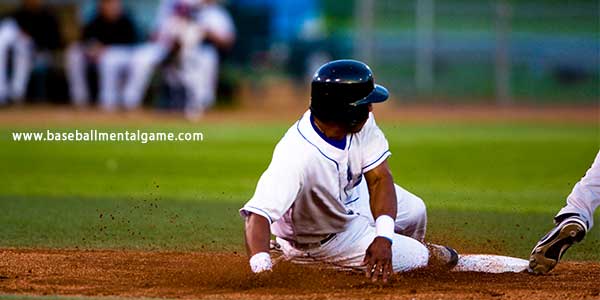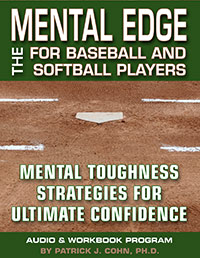
Are Mental Skills Important in Baseball?
Baseball is a mental and physical game. You can’t reach your potential as a baseball player if you only work on one aspect of your game.
Yet many players only work on the physical aspects of the game, such as throwing mechanics, hitting technique, and fielding efficiency.
If you took time to list how your mental game affects your play on the field, the list would be longer than you could imagine.
Your mental game affects everything you do:
- The intensity of your conditioning
- The manner in which you practice
- The speed it takes you to learn new skills
- Your mindset before a game
- Your emotions during a game
- Consistent play
- Nervousness
- Your focus throughout long games
- Your mindset when leading or trailing in games or going into extra innings
- Your goals
- The increased sense of pressure in later innings
- Confidence
- Processing your performance after a game
- The way you communicate with your teammates and coaches
- The way you deal with slumps, streaks, errors, bad weather.
*The way you cope with unfavorable playing conditions, bad umpire calls, rowdy crowds, etc
This list is a small portion of the mental factors that impact your game. If you are only concerned with taking batting practice, you will fall far short of the player you could become.
Chicago Cubs catcher Willson Contreras puts a lot of credence in the mental game.
Contreras had solid seasons his first two years in the big leagues batting .282 and .276, respectively. In 2018, Contreras was selected to the All-Star team but his offense production fell off in the second half of the season and he finished the year with a .249 batting average.
Contreras is back on track in 2019 and he credits his success to an improved mental game.
CONTRERAS: “On offense, I worked mostly on the mental side of the game. I always had the ability to use the whole field, but I was not doing that last season. I put too much pressure on myself to match the numbers I had in (2017). That took a lot away from my concentration. This year has been way different. I have just worked and not put pressure on myself to get numbers. I am letting things happen and using the whole field.”
Contreras also improved is his ability to manage his emotions and deal with failure.
CONTRERAS: “I know that I play with a lot of emotions. I also understand since last year that I’m going to fail more in this game than have success. That’s one thing that keeps my feet on the ground.”
Contreras is proof that physical talent and skills can only take you so far.
If you want to be the very best baseball player you can be, then you need to couple your physical skills with strong mental skills.
Developing Strong Mental Skills:
Be proactive with your mental game! Too often, baseball players put off mental training until they’re in a slump or struggling. “I’m playing well now, maybe later in the season I work on my mental approach.”
Start today. Do an honest assessment of your mental game skills. What areas need to improve? Focus? Confidence? Composure? Trust in your skills? Taking your practice to games? Coping with anxiety or worry? Routines?
What skill can you work on this summer that will help boost your performance in the fall?
If you need help with assessing your mental game and making improvements for the fall, contact us today.
Related Sports Psychology Articles
- Mindset for Learning New Skills
- Concentration Skill For Baseball and Softball
- How Your Mental Game Affects Your Performance in Baseball
*Subscribe to The Sports Psychology Podcast on iTunes
*Subscribe to The Sports Psychology Podcast on Spotify
Get The Mental Edge for Baseball and Softball
If you have trouble taking your practice game to competition and under perform in games, your mental game might be the culprit! Baseball and softball players contact me everyday wanting to know why they become scared, anxious, afraid to make mistakes, and lack trust in their skills during games…
You might have a ton of physical talent and perform great in practice, but if you can’t get the job done when it counts, something is missing and the problem is an inferior mental game–not talent or motivation.
We’ve spent the last six months developing a program to teach you how to improve your mental game in 8 easy-to-apply lessons–the same TOP lessons that I teach to baseball and softball players everyday in my one-on-one mental coaching program!

